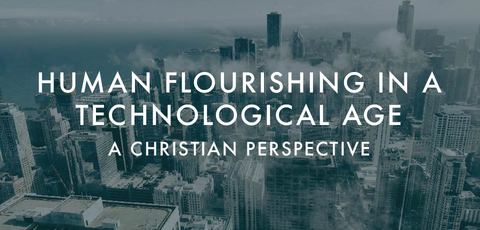
- This event has passed.
Disability, Technology, and Human Flourishing
March 21, 2021 @ 3:30 pm - 4:30 pm EDT

Being human in our technological age requires not merely technical skills but—more importantly—intellectual capacity to navigate a rapidly changing philosophical milieu. Join us this winter for our online lecture series, Human Flourishing in a Technological Age, to learn from leading scholars about key aspects of what it means to be human in a technological age: personhood, embodied cognition, leisure, transhumanism and more.
Please join us on Friday, March 12 as we welcome Dr. Eleanor McLaughlin who will give the lecture “Disability, Technology, and Human Flourishing.”
Dr. McLaughlin will assess the role of technology for human flourishing of people with disabilities in two steps. First, she will define human flourishing as depending in large part on our relationships with others, suggesting that, despite Christian theology’s historical failure to understand this relational core of human flourishing, evidenced by the church’s supporting the us/them divide between people with and without disabilities, there are nevertheless resources within theology that can help overcome this divide, and thus strengthen relationships between all people. Drawing on Dietrich Bonhoeffer’s idea that in the biblical Genesis narrative the limit given to Adam and Eve symbolises God’s grace to humans, and on Deborah Creamer’s ‘limitness’ model in disability theology, Dr. McLaughlin proposes an important distinction between our ontological limitedness, and our encounter with specific limits that prevent us from flourishing. Dr. McLaughlin then will employ this distinction between ontological limitness and specific limits in assessing the value of technological enhancement for disabled persons. This distinction allows an evaluation of technology which is positive when technology’s role is to help us overcome specific limits preventing us from flourishing (particularly in helping us build relationships with others), but which is negative when technology seeks to eradicate the ontological limitedness which gives us the potential to experience God’s grace in our embodied life.
Dr. Eleanor McLaughlin is the Programme Leader for the Postgraduate Programmes in Theology, Imagination, and Culture at Sarum College. She holds a DPhil from the University of Oxford and a master’s degree from the University of Geneva. Ellie’s research interests include disability theology, medical ethics, the theology of Dietrich Bonhoeffer, and the interface between loving and being limited by the Other. She is the author of Unconscious Christianity in Dietrich Bonhoeffer’s Late Theology: Encounters With the Unknown Christ (Lexington Books/Fortress Academic, 2020) and “Dietrich Bonhoeffer and the Death of God Theologians,” in Engaging Bonhoeffer: The Impact and Influence of Bonhoeffer’s Life and Thought, ed. by Matthew D. Kirkpatrick (Fortress Press, 2016), and co-author of “Love in Religion: An Annotated Bibliography,” available online at https://loveinreligion.org/resources.


